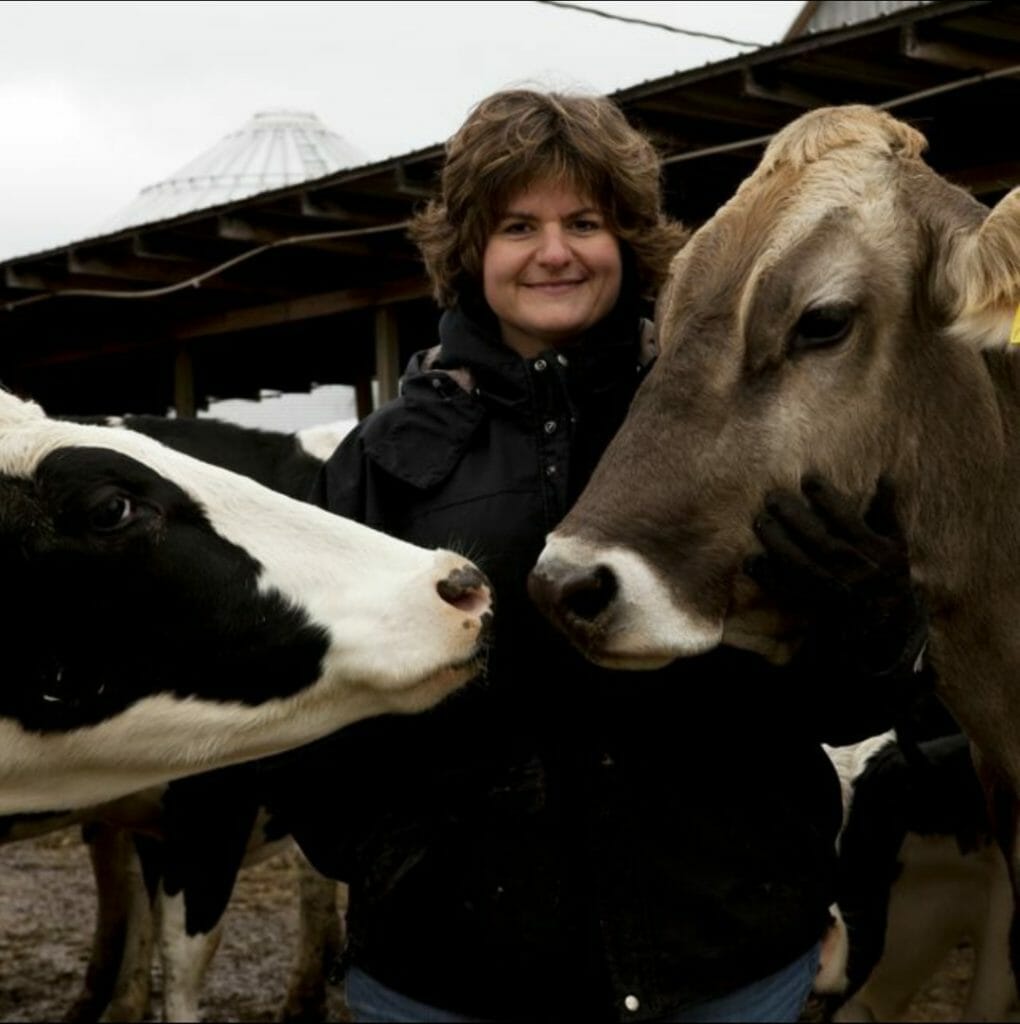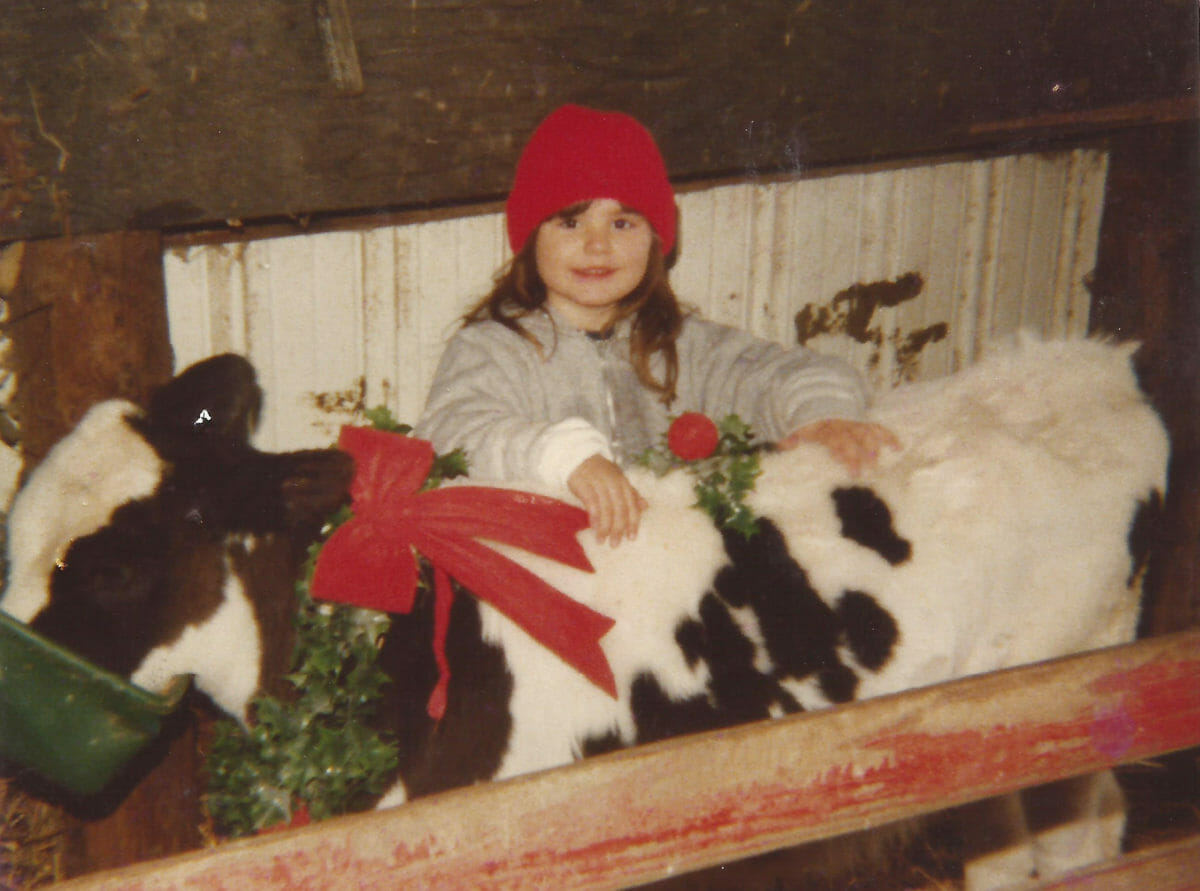Indiana Dairy Farmer Distributes Milk to America’s Hungry
Milk is one of the most requested but least donated items at food banks.
Indiana Dairy Farmer Distributes Milk to America’s Hungry
Milk is one of the most requested but least donated items at food banks.

Sam Schwoeppe
Sam Schwoeppe has seen firsthand the devastating effects malnutrition has on American children. The fourth-generation dairy farmer’s parents fostered more than 100 children while she was growing up in southwest Indiana.
She recalls one particular boy who came to live with her family when he was eight years old. He was so thoroughly malnourished when he first arrived that Schwoeppe says his his skin was flaky, and his hair was gray and falling out. She says it was incredible to see how good nutrition and regular meals transformed the little boy, who lived with her family for six years until he was adopted.
“He actually had red hair and freckles and you never would have guessed that when he first came to live with us,” she says.

This experience and others have helped shape her understanding of food insecurity in America, where as many as 37 million people go hungry and many have problems accessing dairy products. She now serves as a regional dairy manager for Feeding America—a nonprofit that runs a network of 200 food banks across the country—helping to distribute fresh milk and other dairy products. Milk is one of the most requested items at food banks, but it’s also one of the least donated products.
As someone who has grown up seeing the effects of hunger in rural America, she says that the biggest misconception people have about hunger is that it is only in cities. “Hunger is in every community across the country, including our rural areas,” she says. “No one should have to worry about where their next meal comes from.”
Schwoeppe started working for Feeding America after handing over operations of her 100-cow farm, Schwoeppe Dairy, to her two sons. She still works on the farm, but she has more of an administrative role now. Schwoeppe’s job as regional dairy manager involves being a link between food banks and various partners in the food chain, such as farmers and distributors.
She says delivering milk in a timely manner to those in need can be challenging because it’s a fresh product. Dairy farmers cannot donate directly to food banks as milk first has to be processed or made into cheese before it can be distributed to consumers. But there are other ways Feeding America would like to see farmers get involved, such as planting an extra row of crops to donate, or encouraging their agricultural association to engage with local food banks.
Follow us
This work is licensed under a Creative Commons Attribution-NoDerivatives 4.0 International License.
Want to republish a Modern Farmer story?
We are happy for Modern Farmer stories to be shared, and encourage you to republish our articles for your audience. When doing so, we ask that you follow these guidelines:
Please credit us and our writers
For the author byline, please use “Author Name, Modern Farmer.” At the top of our stories, if on the web, please include this text and link: “This story was originally published by Modern Farmer.”
Please make sure to include a link back to either our home page or the article URL.
At the bottom of the story, please include the following text:
“Modern Farmer is a nonprofit initiative dedicated to raising awareness and catalyzing action at the intersection of food, agriculture, and society. Read more at <link>Modern Farmer</link>.”
Use our widget
We’d like to be able to track our stories, so we ask that if you republish our content, you do so using our widget (located on the left hand side of the article). The HTML code has a built-in tracker that tells us the data and domain where the story was published, as well as view counts.
Check the image requirements
It’s your responsibility to confirm you're licensed to republish images in our articles. Some images, such as those from commercial providers, don't allow their images to be republished without permission or payment. Copyright terms are generally listed in the image caption and attribution. You are welcome to omit our images or substitute with your own. Charts and interactive graphics follow the same rules.
Don’t change too much. Or, ask us first.
Articles must be republished in their entirety. It’s okay to change references to time (“today” to “yesterday”) or location (“Iowa City, IA” to “here”). But please keep everything else the same.
If you feel strongly that a more material edit needs to be made, get in touch with us at [email protected]. We’re happy to discuss it with the original author, but we must have prior approval for changes before publication.
Special cases
Extracts. You may run the first few lines or paragraphs of the article and then say: “Read the full article at Modern Farmer” with a link back to the original article.
Quotes. You may quote authors provided you include a link back to the article URL.
Translations. These require writer approval. To inquire about translation of a Modern Farmer article, contact us at [email protected]
Signed consent / copyright release forms. These are not required, provided you are following these guidelines.
Print. Articles can be republished in print under these same rules, with the exception that you do not need to include the links.
Tag us
When sharing the story on social media, please tag us using the following: - Twitter (@ModFarm) - Facebook (@ModernFarmerMedia) - Instagram (@modfarm)
Use our content respectfully
Modern Farmer is a nonprofit and as such we share our content for free and in good faith in order to reach new audiences. Respectfully,
No selling ads against our stories. It’s okay to put our stories on pages with ads.
Don’t republish our material wholesale, or automatically; you need to select stories to be republished individually.
You have no rights to sell, license, syndicate, or otherwise represent yourself as the authorized owner of our material to any third parties. This means that you cannot actively publish or submit our work for syndication to third party platforms or apps like Apple News or Google News. We understand that publishers cannot fully control when certain third parties automatically summarize or crawl content from publishers’ own sites.
Keep in touch
We want to hear from you if you love Modern Farmer content, have a collaboration idea, or anything else to share. As a nonprofit outlet, we work in service of our community and are always open to comments, feedback, and ideas. Contact us at [email protected].by Alex Robinson, Modern Farmer
December 13, 2019
Modern Farmer Weekly
Solutions Hub
Innovations, ideas and inspiration. Actionable solutions for a resilient food system.
ExploreExplore other topics
Share With Us
We want to hear from Modern Farmer readers who have thoughtful commentary, actionable solutions, or helpful ideas to share.
SubmitNecessary cookies are absolutely essential for the website to function properly. This category only includes cookies that ensures basic functionalities and security features of the website. These cookies do not store any personal information.
Any cookies that may not be particularly necessary for the website to function and are used specifically to collect user personal data via analytics, ads, other embedded contents are termed as non-necessary cookies.
Seems, at first glance, like a good way to get milk (and other fresh, nutrishius? food) to people in need. Second glance; how about moving them closer,like next door or onto, a farm! Maybe they can learn to be self-sufficent!jp